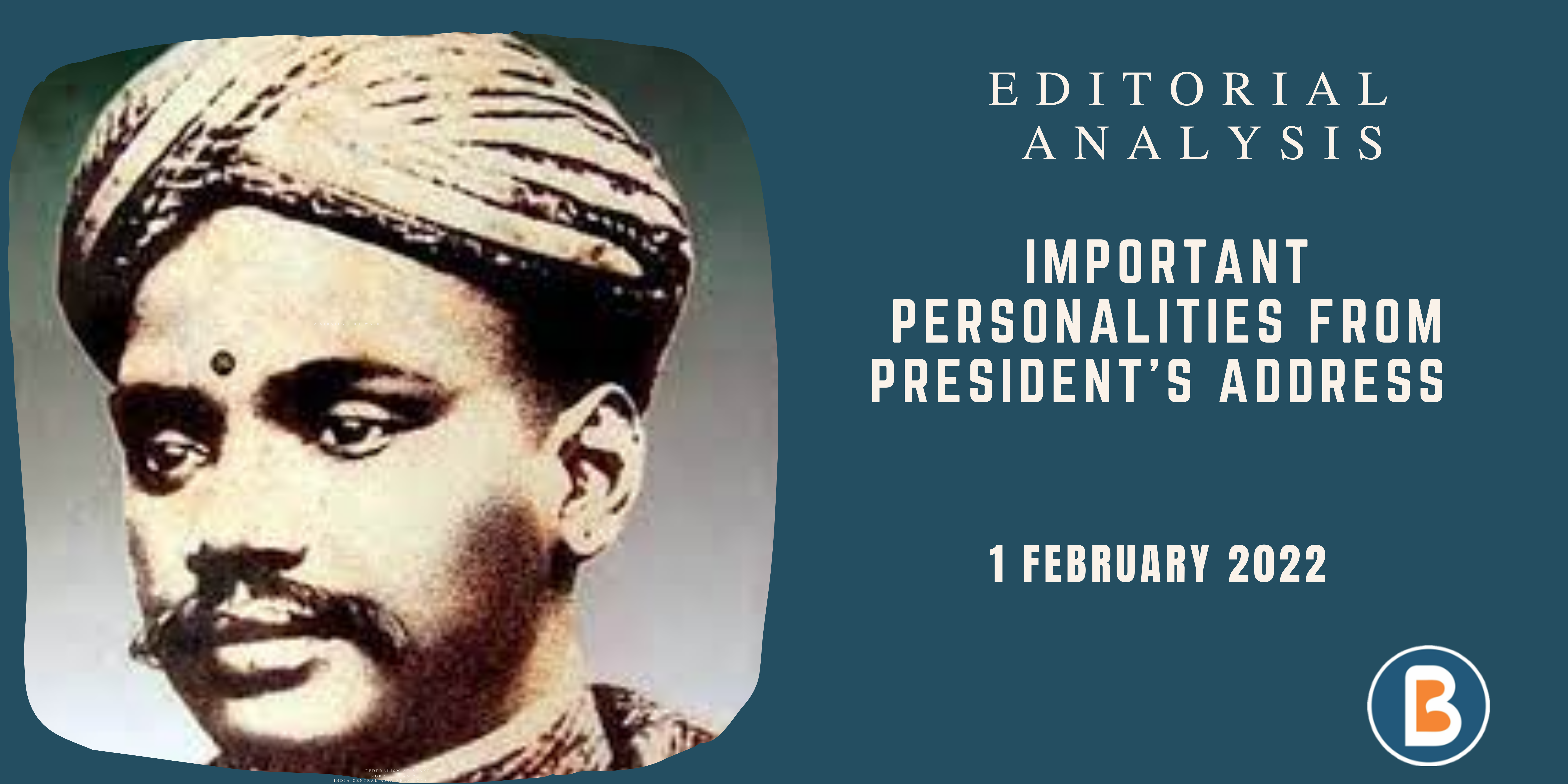Important Personalities from President’s Address
Context:
- The President in an Address to the joint sitting of the parliament he mentioned the names of few personalities which is dealt in this article.
- He stated “In this period of Amrit Mahotsav, special events related to great personalities of the country are also inspiring us. My government is celebrating the sacred occasions of the 400th Prakash Parv of Guru Tegh Bahadur Ji, the 150th birth anniversary of Sri Aurobindo, the 150th birth anniversary of V.O. Chidambaram Pillai and the 125th birth anniversary of Netaji Subhas Chandra Bose with grandeur. From this year onwards, the government has started the Republic Day celebrations from January 23, the birth anniversary of Netaji.”
Guru Tegh Bahadur
- Sri Akhand Pathwas inaugurated at Gurdwara Guru Ke Mahal, the birthplace of the ninth Sikh guru, Guru Tegh Bahadur, to mark the 400th Prakash Purab (birth centenary) of the Guru.
- Guru Tegh Bahadur was the ninth Sikh Guru,often venerated as the ‘Protector of Humanity’ (Srisht-di-Chadar) by the Sikhs.
- Known as a great teacher, Guru Tegh Bahadur was also an excellent warrior, thinker, and poet, who wrote detailed descriptions of the nature of God, mind, body, and physical attachments among other things spiritual.
- His writings are housed in the sacred text,‘Guru Granth Sahib,’ in the form of 116 poetic hymns.
- He was also an avid traveler and played a key role in setting up preaching centersthroughout the Indian subcontinent.
- During one such mission, he founded the town of Chak-Nanki in Punjab,which later became a part of Punjab’s Anandpur Sahib.
- In the year 1675, Guru Tegh Bahadur was executed in Delhiunder the orders of the Mughal Emperor Aurangzeb.
Sri Aurobindo:
- Recently, the Prime Minister has set up a 53-member committee to mark the 150thbirth anniversary of spiritual leader Sri Aurobindo on 15th August 2022.
- Aurobindo Ghose was born in Calcutta on 15thAugust 1872. He was a yogi, seer, philosopher, poet, and Indian nationalist who propounded a philosophy of divine life on earth through spiritual evolution.
- He died on 5thDecember 1950 in Pondicherry.
- His education began in aChristian convent school in Darjeeling.
- He entered the University of Cambridge, where he became proficient in two classical and several modern European languages.
- In 1892,he held various administrative posts in Baroda (Vadodara) and Calcutta (Kolkata).
- He began the study of Yoga and Indian languages, including classical Sanskrit.
- From 1902 to 1910 he partook in thestruggle to free India from the British. As a result of his political activities, he was imprisoned in 1908 (Alipore Bomb case).
- Two years later he fled British India and found refuge in the French colony of Pondichéry (Puducherry),where he devoted himself for the rest of his life to the development of his “integral” yoga with an aim of a fulfilled and spiritually transformed life on earth.
V.O. Chidambaram Pillai
- VOC entered politics in 1905 following the partition of Bengal.
- Towards the end of 1905, VOC visited Madras and was drawn closer to the Swadeshi Movementinitiated by Bal Gangadhar Tilak and Lala Lajpat Rai.
- VOC was drawn towards Ramakrishna Missionand came into contact with Subramania Bharati and the Mandayam family.
- It was not until the arrival of VOC at Tuticorin (Present day Thoothukudi) that the Swadeshi movementin Tirunelveli district began to gather force and momentum.
- By 1906, VOC won the support of merchants and industrialists in Tuticorin and Tirunelveli for the idea of establishing a Swadeshi merchant shipping outfit by the name of the Swadeshi Steam Navigation Company (SSNCo).
- He established many institutions like Swadeshi Prachar Sabha, Dharmasanga Nesavu Salai, National Godown, Madras Agro-Industrial Society Ltd and Desabimana Sangam.
- VOC and Siva were aided in their efforts by a number of Tirunelveli-based lawyers, who formed an organisation called the Swadeshi Sangam, or ‘National Volunteers’.
- The nationalist movement acquired a secondary character with the beginning of the Tuticorin Coral Mills strike (1908).
- Even prior to Gandhiji’s Champaran Satyagraha(1917), VOC took up the cause of the working class in Tamil Nadu, and thus he is a forerunner to Gandhiji in this respect.
- VOC, along with other leaders, resolved to take out a mammoth procession on the morning of 9thMarch 1908 to celebrate the release of Bipin Chandra Pal from jail and to hoist the flag of Swaraj.
Source The Hindu


